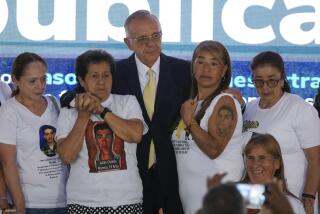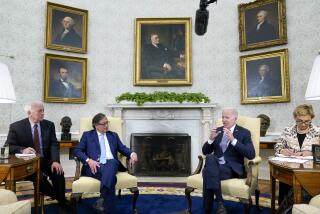Colombia government, FARC rebels reach milestone on path to peace
BOGOTA, Colombia -- In a milestone first step in efforts to end Latin America’s longest-running insurgency, Colombia’s largest rebel group and the government said Sunday in Havana that they had reached an agreement on land reform, the first of six points that would make up an eventual peace deal.
The agreement on agrarian reform, considered a crucial element of any broader accord, is a boost for President Juan Manuel Santos, who last summer took the risky political move of restarting peace talks with the Revolutionary Armed Forces of Colombia, or FARC. The previous effort, the so-called Caguan talks, ended in failure in 2002.
Both sides are motivated to seek peace. The FARC is a much weakened military force kept alive with profits from drug trafficking and extortion, analysts say. For its part, the government sees resolving the half-century conflict as the key to opening up the country to more investment, infrastructure projects and social programs.
In a joint communiqué issued by the FARC and the government, the sides said they had agreed on “integrated rural reform.” Among its features is a “land fund” into which millions of illegally or underused acres will be put for eventual redistribution to displaced people and peasants.
In a statement he read at the Havana convention center where the talks have been held since November, the government’s lead negotiator, former Vice President Humberto de la Calle, cautioned that there will be no peace deal until all six points have been agreed on. Even then, the final package will be put to a nationwide referendum for approval to insure “national participation and transparency.”
De La Calle acknowledged criticism the process has weathered from some Colombia, including former President Alvaro Uribe, who have argued for a military solution. De La Calle called the criticism a sign of a “healthy debate” but insisted the talks are yielding solid advances.
“Now we have a real opportunity to reach peace through negotiations after 50 years of armed conflict,” de la Calle said.
Cuban diplomat Carlos Fernandez de Cossio said the formation of the land bank called “Land Fund for Peace” will be the vehicle by which farmland is redistributed. Farmers will receive loans, technical assistance and marketing advice as well as legal and police protection.
In recent months, several leaders of displaced farmers have been killed by suspected criminal gangs allegedly involved in land grabs.
Pressure was on both sides to come to an agreement, with many Colombian citizens’ patience taxed by the failures of previous peace talks and by suspicion that the rebels were talking only to buy time to regroup and improve their international image. The government, however, has refused to declare a cease-fire in military operation against the rebels.
Before the announcement, FARC negotiator Rodrigo Granda told reporters that negotiating teams for both sides had been up all night the last two days. “We’ve worked with impressive intensity,” he said.
The length of time needed to agree on the first point casts doubt on whether Santos can come up with a peace deal in “months, not years” as he promised when he announced his peace initiative last summer. Well-connected sources said recently that Santos may suspend peace talks this fall to begin his reelection campaign and restart them after elections in May 2014.
In any case, peace talks are scheduled to resume June 11 in Havana to tackle the next thorny issue: how the FARC is to gain political representation, including possible congressional seats, and whether or not rebels will be granted blanket immunity from war crimes, something they have demanded.
Other negotiating points still to be tackled involve the FARC giving up drug trafficking, reparation for victims, the logistics of ending the conflict, and how to implement and verify any final accord.
[For the record, 2:09 p.m. May 26: An earlier version of this post referred to Humberto de la Calle as a former president of Colombia. He was vice president.]
[For the record, 4:19 p.m. May 26: An earlier version of this post referred to Carlos Fernandez Cossio. His correct name is Carlos Fernandez de Cossio, and he is a Cuban diplomat, not a FARC negotiator.]
ALSO:
A FARC rebel in Colombia explains why he wanted out
Brazil seeks source of rumors blamed for run on banks
Rockets hit Beirut, stirring fear of Syria conflict spillover
More to Read
Sign up for Essential California
The most important California stories and recommendations in your inbox every morning.
You may occasionally receive promotional content from the Los Angeles Times.










